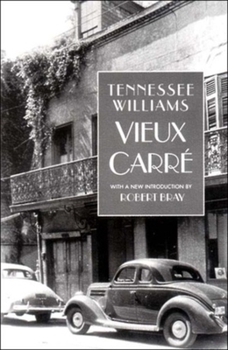Vieux Carre
Select Format
Select Condition 
Book Overview
The drama takes it form from the shifting scenes of memory, and Williams's surrogate self invites us to focus, in turn, on the various inhabitants or his dilapidated rooming house in the Vieux Carr the comically desperate landlady, Mrs. Wire; Jane, a properly brought-up young woman from New York making at last grab at pleasure with Tye, the vulgar but appealing strip-joint barker; two decayed gentlewomen politely starving in the garret; and the dying painter Nightingale, who tries to teach the young writer something about love--both of the body and of the heart. This is a play about the education of the artist, and education in loneliness and despair, in giving and not giving, but most of all in seeing, hearing, feeling, and learning that "writers are shameless spies," who pay dearly for their knowledge and who cannot forget. Building on two decades of Williams scholarship since Vieux Carr was originally published, Robert Bray, editor of The Tennessee Williams Annual Review, has provided a new introduction for this edition, giving the most authoritative account yet of its background and genesis.
Format:Paperback
Language:English
ISBN:0811214605
ISBN13:9780811214605
Release Date:October 2000
Publisher:New Directions Publishing Corporation
Length:116 Pages
Weight:0.36 lbs.
Dimensions:0.3" x 5.3" x 7.8"
Customer Reviews
1 rating
A Wonderful Later Play
Published by Thriftbooks.com User , 23 years ago
*Vieux Carre* is probably the finest play of Williams' "Late" period--and it's terrific, though unfairly neglected. It's much more like the earlier work in terms of a "straight" narrative, and as good as it is I think we'll be seeing many more productions of it in the future.





